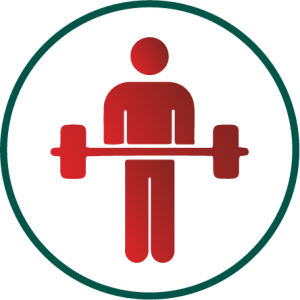20/09/2023
As an athlete, you’re no stranger to sports performance testing. From recording your personal bests to meticulously observing changes in your physical appearance, you’re constantly seeking ways to optimise your training and nutrition. But by evaluating your biochemical signature you could uncover insights that could take your performance to the next level. Enter the Everyathlete package from Randox Health – a comprehensive suite of tests designed to provide key health insights tailored to athletes like you.
Randox Health is the official diagnostic partner for Team GB for the 2024 Summer Olympics in Paris. Together with Team GB, Randox will encourage people to be proactive about their health and Team GB’s athletes will have access to Randox in-clinic and home testing services to help them be in the best possible shape for Paris 2024.
The Science Behind Everyathlete
When you think of a blood test, you would be forgiven for associating this solely with clinical diagnostics and healthcare. However, these tests are increasingly used by many professional sports scientists and athletes to optimise performance. At Randox Health we recognise that everyone’s body is different, and so is every athlete. What works for one person might not be the magic formula for another. This is where understanding your individual “biochemical fingerprint” comes into play. By delving deep into your body’s unique chemistry, the Everyathlete package can help identify what’s right for you, paving the way for targeted improvements in your performance.

Personal Measurements and Full Blood Count
This initial assessment provides a baseline understanding of your health status. This includes an assessment of your physical measurements, blood pressure and oxygen saturation to provide insights into the fundamentals of your health. In addition, the full blood count evaluates your basic health to ensure you have no lingering abnormalities that may affect your performance.

Hormones
Testosterone and cortisol levels play a crucial role in an athlete’s performance and recovery. Discovering your hormone balance can be a game-changer. Testosterone plays an important role in muscle growth and athletic performance in both men and women. It is a marker of anabolic status (building and maintenance of muscle mass).
Endurance training can deplete your levels of testosterone, so if you already have low levels, this could dramatically affect your performance.
Conversely, cortisol is a marker of catabolic status (breakdown or loss of mass, both muscle and fat). High levels of cortisol, also known as the stress hormone, can hinder recovery. Identifying this can allow changes to your training regime to reduce overtraining1.
These hormones, along with the others tested in the Everyathlete package, can provide information that may aid performance, recovery, hormonal balance and evaluate the impact your training has on your body.

Thyroid Hormones
The thyroid is a gland located in the neck. It produces a range of hormones responsible for the body’s growth, development, and metabolic rate. Imbalances in hormones can occur because of a lack of available energy due to reduced energy intake, excessive exercise or both2. One of these hormones is triiodothyronine. Free T3 (free triiodothyronine) is an indicator of energy availability in your body1. Optimising thyroid function can boost your endurance and overall performance. The Everyathlete package also tests for free thyroxine (FT4) and thyroid stimulating hormone (TSH). Together, these biomarkers provide information that can help assess how well the thyroid gland is functioning, helping detect imbalances that could negatively impact stamina and performance3.

Muscle, Joint, and Bone Health
Muscle injuries are very common in high-performance sports. Recently the emotional video of a father carrying his distraught son over the Olympic 400m finish line went viral. During the 1992 Summer Olympics in Barcelona, Team GB Athlete Derek Redmond tore his hamstring within the first 30 seconds of his run.
His father, Jim Redmond, proceeded to gather his tearful son and carry him over the finish line, unphased by the officials who were trying to usher him back to his seat. This shows how muscle injuries can be devastating to competitions and even careers.
Biomarkers such as creatine kinase (CK), myoglobin, and calcium can shed light on your musculoskeletal health. CK is an enzyme in muscle cells. When muscles are damaged, CK gets released into the bloodstream. Monitoring CK concentration in your blood can help guide alterations in your training schedule to reduce overtraining and improve recovery.
Myoglobin is also found in muscle cells and is important for storing oxygen. Like CK, high myoglobin levels indicate muscle injury and overtraining4. Calcium is a mineral crucial to a wide variety of bodily functions, but it is commonly associated with bone health. However, it is also vital for muscle contraction. Low levels of calcium can lead to muscle cramps5, which can quickly put a stop to training or competition. Maintaining strong bones and muscles is essential for peak athletic performance.
Inflammation
High levels of C-reactive protein (CRP) can indicate inflammation, which can impact your recovery and training. Inflammation can affect sports performance by causing muscle damage, immune system dysfunction, and oxidative stress. Overtraining can cause inflammation in various parts of your body, so it’s vital to monitor your inflammatory status to optimise your health and performance. It’s also important to add that exercise is known to reduce inflammation6.

Nutritional and Iron Status
TAS (total antioxidant status), vitamin B12, vitamin D, iron, ferritin, TIBC (total iron-binding capacity), folic acid and transferrin levels reveal your nutritional status and iron levels. Nutrient deficiencies can hinder your progress as an athlete.
TAS is an indicator of antioxidant levels which are essential for combating oxidative stress and muscle damage. Iron and vitamin B12 are involved in red blood cell production and therefore an integral part of supplying oxygen to your muscles.
Ferritin is a protein that the body uses to store iron, providing additional information about your iron status. Vitamin D evaluation can provide insights into your muscle and bone health. Evaluating these biomarkers provides insights into the body’s ability to handle oxidative stress, red blood cell production, oxygen delivery, bone health, muscle function, and iron transport.
Overall Wellbeing
Even if you’re in top-notch condition, there’s always a chance you have an underlying condition that you are unaware of. A good example is Bronny James who collapsed at a training session in July 2023. Bronny is the 18-year-old son of NBA superstar, Lebron James. He was a top prospect to join the NBA in the coming years. During a training session at the University of Southern California, he collapsed, suffering a heart attack.
Testing confirmed that Bronny suffers from a significant congenital heart defect that he was unaware of. What’s more, Bronny was one of several college athletes to suffer this fate in the last year. Gladly, Bronny is in stable condition and is expected to make a full recovery and return to basketball. However, stories like this show that even athletes at the pinnacle of their game can harbour conditions that could affect their performance or worse, their health. Included in the Everyathlete package is a diabetes health test, as well as heart disease risk, liver function, and kidney function tests to analyse your overall well-being and risk factors for a variety of conditions.
The Everyathlete Test
With the Everyathlete package, you receive a flexible health plan, including 2 health checks per year, to provide both real-time analysis and monitoring of all the factors mentioned in this article and more. You can arrange an appointment that suits both your personal and training schedule during which we’ll take some samples, and you can ask any questions you might have. You’ll get a health plan after 2-5 working days. Included will be a detailed explanation of your test results and some advice on the next steps you may wish to take. You also have the option of booking a health and wellbeing discussion with a member of our highly trained team, or a GP appointment. Finally, for male athletes, you can also opt to include a PSA test to investigate your prostate health.
There’s nothing generic about your training regime, so why be generic with your performance? Whether you’re a professional athlete training for your next competition or match or are simply committed to personal improvement, you could benefit from an Everyathlete test.
Reference List:
1. Pedlar CR, Newell J, Lewis NA. Blood Biomarker Profiling and Monitoring for High-Performance Physiology and Nutrition: Current Perspectives, Limitations and Recommendations. Sports Medicine. 2019;49(S2):185-198. doi:10.1007/s40279-019-01158-x
2. Areta JL, Taylor HL, Koehler K. Low energy availability: history, definition and evidence of its endocrine, metabolic and physiological effects in prospective studies in females and males. Eur J Appl Physiol. 2021;121(1):1-21. doi:10.1007/s00421-020-04516-0
3. Kong SH, Kim JH, Park YJ, et al. Low free T3 to free T4 ratio was associated with low muscle mass and impaired physical performance in community-dwelling aged population. Osteoporosis International. 2020;31(3):525-531. doi:10.1007/s00198-019-05137-w
4. Lee EC, Fragala MS, Kavouras SA, Queen RM, Pryor JL, Casa DJ. Biomarkers in Sports and Exercise: Tracking Health, Performance, and Recovery in Athletes. J Strength Cond Res. 2017;31(10):2920-2937. doi:10.1519/JSC.0000000000002122
5. Larson-Meyer DE, Woolf K, Burke L. Assessment of Nutrient Status in Athletes and the Need for Supplementation. Int J Sport Nutr Exerc Metab. 2018;28(2):139-158. doi:10.1123/ijsnem.2017-0338
6. Elkington LJ, Gleeson M, Pyne DB, Callister R, Wood LG. Inflammation and Immune Function: Can Antioxidants Help the Endurance Athlete?; 2015.



